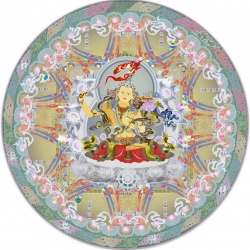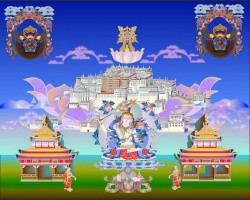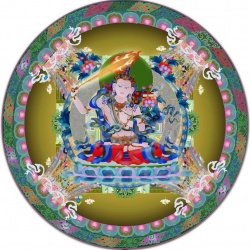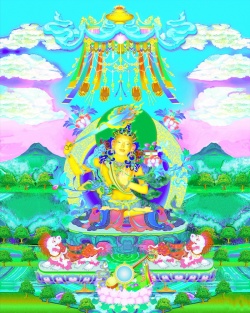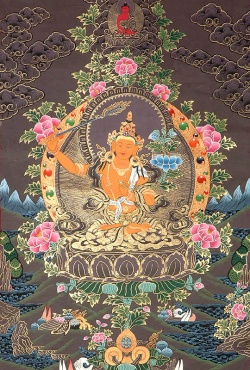Manjusri : The Bodhisattva of Wisdom
By Lin Sen-shou
In past issues, Lin Sen-shou introduced the ten greatest disciples of Sakyamuni Buddha, as well as two other buddhas. Here, he begins a series on the great bodhisattvas of Buddhism.
Because Buddhism was founded in India, many Buddhist terms are in Sanskrit. In Buddhist scriptures and in our magazine, the word "bodhisattva" appears quite often. In Mahayana Buddhism, the word refers to a person who seeks the buddhahood, and "whether monk or layman, he seeks enlightenment to enlighten others, and he will sacrifice himself to save others; he is devoid of egoism and devoted to helping others." [William Soothill and Lewis Hodous, A Dictionary of Chinese Buddhist Terms, Rev. by Shih Sheng-kang, Lii Wu-jong and Tseng Lai-ting. 2nd. Ed. Taipei: Fokuang Publishing House (1994): 389.]
People must pass through ten stages to achieve bodhisattvahood, based on the level of their spiritual perfection. A bodhisattva-mahasattva, or great bodhisattva, is at the tenth and final stage and is thus ready to become a buddha and enter nirvana. However, some bodhisattvas, like the Great Compassion Bodhisattva and the Great Vow Bodhisattva, compassionately vow to delay their entry into nirvana so that they can continue to work for the salvation of all living creatures.
In this issue and in the following issues of the Tzu Chi Quarterly, the author would like to introduce four famous bodhisattvas to the readers: Manjusri, Samantabhadra, Avalokitesvara and Ksitigarbha. Bodhisattvas are often thought of as personifications of certain virtues. Manjusri is known for his wisdom, Samantabhadra for his goodness, Avalokitesvara for his compassion, and Ksitigarbha for his vow to save all living beings.
In this issue, I would like to start with Manjusri Bodhisattva. His name can be divided into two parts. "Manju" means "beautiful" and "sri" can be interpreted as "good fortune, virtue, majesty, lord, an epithet of a god." [Ibid., p.153]
Images of Manjusri
Manjusri Bodhisattva is regarded as the crown prince of Buddhist teachings, or the one who can best explain "prajna." "Prajna" is a Sanskrit term that is generally translated as "wisdom," but it refers to the Buddhist wisdom that is able to extinguish afflictions and bring about enlightenment. It does not refer to worldly wisdom. Manjusri has this title because eons ago, he was the instructor for seven different buddhas, the last being Sakyamuni Buddha. Sakyamuni once said that he was grateful to Manjusri for instructing him in the Buddhist dogmas. The Buddha further stated that hundreds of buddhas in the past also owed their enlightenment to Manjusri because of his instruction.
Since Manjusri is identified by this title, he is often depicted with his right hand holding a sword and his left hand holding a lotus flower on which rests the Prajnaparamita Sutra (Great Wisdom Sutra). He is often seen riding a lion. The sutra on the lotus flower symbolizes wisdom as pure as the flower. The sword represents the sharpness of prajna that can destroy all types of arrogance. The lion symbolizes the stern majesty of prajna.
He is also commonly portrayed as a child with five topknots. A child is a figure of truth, radiance, purity and innocence. When our minds are in such a state, they can reflect the truth of everything, including ourselves. The five topknots are the five divisions of a buddha's wisdom: the wisdom of pure consciousness, the wisdom to reflect all things, the wisdom to regard all things equally and universally, the wisdom of profound insight, and the wisdom to seek the greatest good for oneself and others.
Manjusri's Teachings
It is said that Manjusri Bodhisattva came from the land of Ratnaketu Buddha in the east. The bodhisattva preached the Buddhist doctrines of non-distinction and non-retraction to attain nirvana. His method was quite different from that of Sakyamuni Buddha. The Buddha taught that all things are created by our minds and bodies, which then create karma through the interaction of the senses with the things we see, hear, taste, etc. In sum, the Buddha taught from the bottom up, step by step. Manjusri, on the other hand, went directly to the top, the meaning of the supreme truth, or nirvana. In the supreme truth, everything is void, even buddhas. The real existence of a buddha is invisible. Nothing is created or destroyed. Everything is created conditionally. When the condition ends, so does the thing.
Manjusri once had the following conversation with Sariputra. Manjusri asked Sariputra, "What am I?"
Sariputra replied, "I have a name, but the reality of a name is actually void."
"That's right," Manjusri said. "I have a name. Buddhas also have names. A thing like 'name' is actually void, and that is the supreme truth. It is neither born nor destroyed. It neither comes nor goes away. It has neither name nor substance. That is named 'buddha.' If we observe our own bodies as such, we should also see buddhas in the same manner. Only wise people know this. That is how you should see a buddha."
Venerable Master Yin Shun, Master Cheng Yen's mentor, expounds on this topic in one of his books. He notes that each person only has a name, therefore we are all void, like buddhas. So observing ourselves is like observing buddhas. When we observe the reality of ourselves, we see the true buddha.
Manjusri Bodhisattva wanted his listeners to attain enlightenment immediately, so his way of teaching the Buddhist dogmas is quite exceptional. Even if his listeners could not accept his teachings, insulted the dogmas and thus fell into hell, he would still insist on preaching in his own way. One time, a hundred monks fell into hell because they had evil thoughts while listening to Manjusri preaching. Sariputra objected to Manjusri, "You just lost those hundred monks because of your preaching. You should protect people from your speech!"
"Those hundred monks just fell into hell," Manjusri countered, "but in a short while they will ascend to heaven. When Maitreya Buddha comes to this world, those hundred monks will attain the arhathood from that buddha's teachings. If they had not heard my teaching, they would not be freed from the cycle of rebirth."
There are quite a few stories about his unusual way of teaching. In a sutra titled Manjusri's Exposition on Mahaprajnaparamita, there is a dialogue between Manjusri Bodhisattva and Sakyamuni Buddha. When Manjusri said that bodhisattvas should make offerings to all the buddhas to plant all the good roots, the Buddha asked him, "How many buddhas have you presented offerings to?"
"The buddhas and I are all illusory," Manjusri replied. "I don't see 'I' as an offerer nor 'buddhas' as the recipients of these offerings."
"You said that buddhas are illusory. Aren't you following the Mahayana teachings?"
"As I see it, everything is void, so there is no such thing as Buddhist teachings. Then, how can there be any Mahayana teaching for me to follow?"
"Do you possess the unobstructed prajna?"
"My own nature is already unobstructed, so why should I acquire the unobstructed prajna?"
In reality, Manjusri and the Buddha were simply using this dialogue to clarify the truth of the universe. Giving alms to buddhas or anyone else is a good deed, but the most important thing is that after we make an offering, we must not keep thinking about it. We must not keep thinking: I offered this thing to this person, and this person received my offering. In other words, we must not cling to the memory of almsgiving or any other event. Our universe, including the Buddhist teachings, is impermanent. It comes and goes. When conditions are met, a thing is created or happens. When the conditions disperse, the same thing is destroyed or ends. In Buddhism, a conditional thing is viewed as "void" or not real. Thus, we should not become bound to things, events or people around us, and we should not judge what is good or bad, beautiful or ugly, etc. Eventually we can be free from all our bonds.
Under the influence of Devadatta, the infamous disciple of Sakyamuni Buddha, Prince Ajatasatru jailed his father and usurped the throne. He forbade anyone to bring food to his father. His mother did secretly bring him food, but when the prince discovered this, he confined his mother to the back of the palace. Finally, the old man died in jail. King Ajatasatru later felt very guilty about the whole event, so he asked Manjusri to preach to him, hoping that he could thus atone for his crime. However, Manjusri simply said to him, "I can't teach you anything. Not even a buddha could do that." His last hope having been dashed, Ajatasatru fell in despair to the floor.
Master Yin Shun explains that what Manjusri wanted to say was that everything, even crime itself, is formed conditionally. Thus, everything has no nature and no ego, and is thus void. Since everything is void, how can anything, including crime, be talked about?
Not only were Manjusri's words so unusually direct, but his behavior was also quite unconventional.
The regular summer retreat was important for the monks and the nuns. In India, summer is the monsoon season when it rains heavily. Normally, the monks went out to beg for food, but the constant rain made this very inconvenient. At the same time, there were a lot more insects and worms because of the rain. If the monks or nuns went out, they might kill the insects by accidentally stepping on them. Hence, the Buddha laid down the rule that every disciple should stay in the abode or some other appointed place for three months, during which time they should engage in self-reflection and practice the buddha's teachings. During this period, monks or nuns could not enter the palaces or come into contact with certain people. If anyone broke the rule of the summer retreat, the violator would lose the privilege to accept food.
One year, Manjusri disobeyed Sakyamuni Buddha's rule and did not participate in the summer retreat. He was nowhere to be seen, and no one knew where he was. In fact, he spent this time with children and prostitutes and with the maids in the palace of Sravasti.
At the end of the summer retreat, when Kasyapa learned that Manjusri had violated the Buddha's regulation by spending three months with these people, he took up his staff and demanded that Manjusri be expelled from the assembly. Suddenly, Manjusri created copies of Kasyapa and himself in every buddha's land. Sakyamuni Buddha's body then shone brightly, illuminating all those other lands. The Buddha spoke to Kasyapa: "Take a look, Kasyapa. Which Manjusri are you planning to expel? Do you want to expel a countless number of Manjusris from countless buddhas' lands?"
Kasyapa realized he was no match against Manjusri, but he was unable to lay down his staff. Sakyamuni Buddha then told Kasyapa to make obeisance to Manjusri. Kasyapa bowed as he was told and he was then able to put down his staff.
The Buddha said to Kasyapa, "Kasyapa, Manjusri spent three months with maids and children, but he has taught five hundred women, five hundred boys and five hundred girls, who will never lose their determination to seek enlightenment."
Realizing how wise Manjusri was to be able to bring these women and children into Buddhism, Kasyapa then asked him how he did it. "I used many methods to teach them," Manjusri replied. "I used games, or I used money, or I applied good deeds, or I showed my magical powers, or I showed the appearances of various deities, or I showed the appearance of a buddha, or I showed a horrible face, or I appeared in other forms. Why? People are different, so I had to preach to them in many ways."
People have different levels of intelligence, so it is necessary to apply appropriate methods to get the message across. Therefore, preachers should not separate themselves from other people by living an overly ascetic lifestyle.
One day, five hundred monks attained the power to see their past. They discovered that in the past, they had killed their own parents and committed other serious crimes. They began to doubt whether they could ever truly attain enlightenment. Sensing their dismay and wanting to help them, the Buddha transmitted his thoughts to Manjusri. Manjusri took out his sword and held it against the Buddha.
The five hundred monks were shocked to see Manjusri doing something so unthinkable, but then they realized that the mind was illusory, like a dream. If they viewed everything as illusory and without self, then there were no killers, no crimes and no victims, since everything existed only conditionally. The five hundred monks then attained enlightenment.
Another time, two hundred celestial beings felt that the path to enlightenment was too difficult and they wanted to give up their spiritual formation. Sakyamuni Buddha knew what they were thinking, so he created an elder who brought a bowl of rice to the assembly and offered it to the Buddha. When the Buddha picked up the bowl, Manjusri reminded him that he should be grateful to his own teacher-who in a past life had been Manjusri himself. So, the Buddha put down the bowl, but it started to sink down underground. It passed through seventy-two buddhas' lands to the land of a buddha named "King of Brightness." Sariputra, Mahamaudgalyayana and Subhuti, three of Sakyamuni Buddha's disciples, all tried to find where the bowl had gone, but none of them could find it. The Buddha then asked Manjusri to retrieve it.
Without moving from his seat, Manjusri extended his hand. It kept stretching downwards until it finally reached the land of the King of Brightness and retrieved the bowl. The bodhisattvas in the buddhas' lands below all marveled at the power of such a person in this world, and they also came to hear the Buddha teach.
When Manjusri handed the bowl to the Buddha, the Buddha then told the two hundred celestial beings that at some time in a past life, Manjusri had been his mentor. Countless other buddhas and bodhisattvas had also been Manjusri's students in the past. This was why Manjusri had reminded the Buddha to be grateful to his former teacher. The celestial beings were inspired, and they determined not to abandon their search for enlightenment.
Another time, it rained for seven days straight, and the Buddha asked Manjusri to beg for food for the assembly in the city of Sravasti. Mara, the Evil One, knew that Manjusri was going to Sravasti to beg for food, so he transformed himself into an old man and told the residents of Sravasti not to open their doors to Manjusri and not to give him food.
When Manjusri went into the city, he noticed that people would not open their doors to him, and he realized what Mara had done. He then made an incredible vow: "All the devils of this universe are no match for the merits of even one single hair on my body. If this is true, Mara's transformation will disappear and I will make him go and tell every resident of the city to give me food. Anyone who offers me food will receive the greatest merit."
Then, as Manjusri vowed, all the doors were opened and people came out and gave him food. He went back to the assembly with loads of food for every member of the assembly.
The Worship of Manjusri in China
There is a famous place in China that is the center for the worship of Manjusri: Wutai Mountain in the province of Shanxi in eastern China. As written in a sutra, the Buddha predicted that after he passed away, Manjusri Bodhisattva would reside on a mountain named Wuting in a country in the east named "Great China," where he would teach the Buddhist dharma. Hence, Chinese people regard that mountain, now called Wutai Mountain, as a sacred place for worshipping Manjusri. Many temples dedicated to this bodhisattva have been built there.
Past, Present and Future
Manjusri, as we have seen, is an incredible bodhisattva who had the outstanding wisdom and power of a buddha. Actually, he was a buddha before Sakyamuni Buddha's time and he was also Sakyamuni's teacher in a previous life.
I mentioned earlier that he was a buddha in the past and also the instructor for seven buddhas. His title was "Supreme Buddha of the Dragons" in a place in the south called "Equal World." Sakyamuni Buddha said that Manjusri was born to a Brahmin family in Sravasti. When he was born, his whole home was transformed like a lotus flower. His body was a purple-golden color and seven treasures covered him. As soon as he was born, he was able to speak. He later studied under Sakyamuni Buddha. After he attained enlightenment, he became a famous figure in Buddhism. Manjusri Bodhisattva is now a buddha with the name "Spiritual Buddha Who Joyfully Cares for the Jewel." In the future, he will be the "Buddha Universally Revealed" in a world called "World Without dust," and he will unite the lands of all the buddhas.
